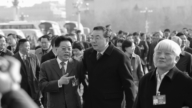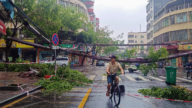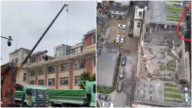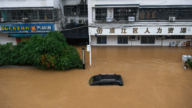【新唐人2014年09月20日訊】18號凌晨5點左右,南京市六合區原區委書記婁學全,被妻子發現在家裏上吊自殺。隨著當局推進所謂的「反腐」,今年中國各地出現了多起官員非正常死亡現象,其中自殺的比例約佔到三分之二。官方媒體說,有些官員是「畏罪自殺」。但這些自殺官員,即使能被報導出來,自殺的動機也是不公布於眾。官員為甚麼要自殺?公眾能知道真相嗎?請看報導。
《新京報》18號報導,當天凌晨5點多,南京市六合區原區委書記婁學全,被妻子發現在家裏上吊自殺。報導說,婁學全因為在在帶領區委、區人大、區政府、區政協四套班子成員,去南京化工園考察調研時,接受宴請,並收受慰問金,今年6月被江蘇省委免職,並受到黨內嚴重警告處分。
而就在4天前,山西運城市經信委主任董學剛,從9樓的家中墜樓自殺。之前,在8號,中秋節的晚上,呼和浩特市政協原主席張彭慧,在辦公室割腕自殺身亡。9月份才過去一半多,至少已經有3名中共官員自殺身亡。
實際上,進入今年以來,類似婁學全、董學剛、張彭慧這樣,非正常死亡的中共官員人數增加。《人民日報》16號說,根據不完全統計,今年以來,至少有30多名官員非正常死亡,其中有20人是自殺。
報導說,被官方披露出的,官員非正常死亡原因主要有三種:一是勞纍過度致死﹔二是工作壓力大、不堪抑鬱症困擾自殺﹔三則是畏罪自殺。
不過,評論人士認為,事實上,官員的死因並不這麼單純。
時政評論員汪北稷:「我們知道很多的自殺,從中共的口中宣傳出來是自殺,實際上未必是自殺,也許是他殺,也許是殺人滅口。所以在這個環境中觀察,在中共的大環境當中,沒有人是安全的,這成一個惡性的循環,今天是施暴者,明天可能成為自殺者或者被殺。」
大陸詩人、獨立作家王藏表示,中共官場的矛盾超出想像。身在官場中的人,更加知道權鬥的可怕。
大陸詩人、獨立作家王藏:「當局不僅對民眾實施人權迫害,官員也不能夠倖免。沒有哪一個官員他有安全保障。他們自身貪腐不說,但是他們如果是內鬥受害者,同樣和普通的民眾一樣,不能通過法治司法救濟,使自己獲得生命權的保障。」
根據大陸媒體不完全統計,去年1月到今年4月,共有54名官員非正常死亡。其中自殺最多,23人,喝酒死排第二。而今年截止到9月19號,至少已經有37名官員非正常死亡,其中22人被認為是自殺。
而中國民間流傳的,中共官員非正常死亡人數,更遠遠超過媒體的統計數字。去年網上流傳的一份,據稱是中央紀委內部通報的統計資料顯示,內地各省(區)、直轄市紀委、公安部門上報的,黨政部門、機關、國企、事業單位的黨員、黨員幹部失蹤者有6500多人、外逃者8300多人、自殺死亡者1200多人,合計超過1萬6千人。
但是,能夠被大陸媒體報導出來的官員自殺事件,自殺動機幾乎都沒有公開,很多只是寥寥幾句話帶過,或者說仍在調查中,就再也沒有進一步的追蹤報導。而官方對於自殺官員的調查,最後也都是不公布於眾。
原《河北人民廣播電臺》編輯朱欣欣分析,這些自殺的官員,可以歸為以下幾類:一,怕牽連到自己家族的一系列財產問題,為保親戚、朋友自殺﹔二,掌握中共太多黑幕,在利益衝突中被滅口;三,為了保護上司被迫自殺;四,深陷官場各種矛盾中,壓力過大自殺。
原《河北人民廣播電臺》編輯朱欣欣:「他們的生命消失也是一個悲劇,更深層的是這個制度的悲劇,專制制度是一個自我毀滅,同時也毀滅他人的這麼一個制度,它是非人性化的,它整個制度的設計和運行是和人性相違背的,和人的良知和公平正義是相違背的,這樣很多官員在這個機制裏面,體制裏面有很多的矛盾,內心的掙扎。」
朱欣欣指出,這些官員不管甚麼原因自殺、或非正常死亡,都不應該成為調查的終點,而應該成為對他全面調查的起點,給公眾一個交待。
採訪編輯/李韻 後制/鍾元
CCP Officials’ Unnatural Death Toll Rises
With anti-corruption campaigns ongoing in China,
many officials have died of unnatural causes this year,
with two-thirds said to be suicides.
Official media say fear is the main reason behind the suicides,
but what’s the true cause?—It hasn’t been made public.
Sept. 15, morning—director of the Commission of Economy
of Yuncheng City, Shanxi Province—Dong Xuegang
fell to his death from his ninth-floor apartment.
Sept. 8, the night of mid-autumn festival—former chairman
of the Chinese People’s Political Consultative Conference,
Hohhot City—Zhang Penghui was found dead in his office
with his wrists slit.
The number of such officials who are dying
of unnatural causes are on the rise.
At least 30 officials have died of unnatural causes this year
according to incomplete statistics, reported People’s Daily
on Sept. 16—out of these, 20 were said to be suicides.
The report says there are three main causes of deaths
that have been revealed officially—extreme fatigue, suicide
caused by severe depression from pressure at work,
and suicide from fear of criminal conviction.
However, commentators believe the true reasons
are not so simple and straightforward.
Wang Beiji, Current affairs commentator:
“It’s common knowledge that many of the ‘suicides’
are not really suicides, although the CCP claims they are.”
“They could be murder cases; killed to be silenced…
in this sense, nobody is safe in the CCP’s environment.”
“This forms a vicious circle; the tyrants of today could be
the victims of murder and so-called ‘suicides’ tomorrow.”
Chinese poet and independent writer, Wang Zang says
the struggles and conflicts within the CCP’s political arena
exceed imagination; only those who are part of it understand
the true terror of those power struggles.
Wang Zang: “Not only do authorities commit human rights
abuses against people, the officials themselves are affected;
there’s not a single official whose safety is secured.
They’re implicated in corruption and may also be victims
of power struggles, where like common folks, they can’t
seek help, redress or protect their lives from the system.”
According to incomplete statistics from Chinese media,
a total of 54 officials have died of unnatural causes
between January 2013 and April 2014; suicides being
the highest at 24 cases, and secondly, drink related deaths.
The number of officials dying unnaturally has risen this year;
there have already been 34 deaths by the end of August,
with 19 cases believed to be suicides.
But the numbers passed around among Chinese society
far exceed the estimate given by official media.
Last year, a document circulated online, purported to be
the Central Commission for Discipline Inspection’s
internal report, showed over 6,500 people missing,
over 8,300 escapees and over 1,200 suicide victims.
These were CCP members from various state departments,
state organizations, state owned enterprises and institutions.
These numbers had come from numerous reports
by Discipline Committees of various provinces
and municipalities, as well as the police departments;
the total number of affected personnel exceeds 16,000.
However, among the suicide cases reported by Chinese media,
none of their motives have been revealed to the public.
Many reasons for the deaths are only mentioned briefly,
or claimed to still be under investigation.
But there are no follow-up reports, so investigation results
are never revealed publicly.
Former editor of Hebei People’s Radio, Zhu Xinxin says
officials committing suicide may be classified as follows:
One—they were afraid to implicate their families and friends
in a series of financial questions and died to protect them;
Two—they had too much insider information on the CCP,
and were murdered to be silenced due to conflicts of interests;
Three—they were forced to commit suicide
to preserve their superiors’ positions;
Four—they were embroiled in irreconcilable power conflicts
and were driven to suicide by the immense stress.
Zhu Xinxin, “The loss of such lives is a tragedy,
but on a deeper level, this entire system is a tragedy.”
“Autocratic systems are destructive to themselves and others;
they’re dehumanized; the entire system’s design and process
contradicts humanity, as it’s against the human conscience
of justice and fairness.”
“So these officials within the system are tortured by doubts,
conflicts and inner struggles.”
Zhu Xinxin says, regardless of what reasons are behind
these officials’ unnatural deaths and suicides, finding them
should not signal the end of the investigations, but a start of
a thorough search, in the interests of public accountability.
Interview & Edit/Liyun Post-Production/Zhongyuan




























